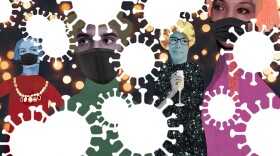
Maria Godoy
Maria Godoy is a senior science and health editor and correspondent with NPR News. Her reporting can be heard across NPR's news shows and podcasts. She is also one of the hosts of NPR's Life Kit.
Previously, Godoy hosted NPR's food vertical, The Salt, where she covered the food beat with a wide lens — investigating everything from the health effects of caffeine to the environmental and cultural impact of what we eat.
Under Godoy's leadership, The Salt was recognized as Publication of the Year in 2018 by the James Beard Foundation. With her colleagues on the food team, Godoy won the 2012 James Beard Award for best food blog. The Salt was also awarded first place in the blog category from the Association of Food Journalists in 2013, and it won a Gracie Award for Outstanding Blog from the Alliance for Women in Media Foundation in 2013.
Previously, Godoy oversaw political, national, and business coverage for NPR.org. Her work as part of NPR's reporting teams has been recognized with several awards, including two prestigious Alfred I. DuPont-Columbia University Silver Batons: one for coverage of the role of race in the 2008 presidential election, and another for a series about the sexual abuse of Native American women. The latter series was also awarded the Columbia Journalism School's Dart Award for excellence in reporting on trauma, and a Gracie Award.
In 2010, Godoy and her colleagues were awarded a Gracie Award for their work on a series exploring the science of spirituality. She was also part of a team that won the 2007 Nancy Dickerson Whitehead Award for Excellence in Reporting on Drug and Alcohol Issues.
Godoy was a 2008 Ethics fellow at the Poynter Institute. She joined NPR in 2003 as a digital news editor.
Born in Guatemala, Godoy now lives in the suburbs of Washington, DC, with her husband and two kids. She's a sucker for puns (and has won a couple of awards for her punning headlines).
-
The CDC says you can end isolation after five days. But emerging research shows with omicron, many people could be infectious for several days past that. So how do you determine if you're good to go?
-
A new study shows that getting the COVID vaccine during pregnancy confers significant protection to infants after birth.
-
While governors in several states are moving to lift mask mandates, the Centers for Disease Control and Prevention today reiterated that it's not changing it's mask guidance.
-
Recent research and anecdotes suggest some people are testing negative on rapid tests even after they have symptoms, then later testing positive. Here's what researchers think is going on.
-
Making exercise a daily habit can feel daunting if it feels like it counts only when you go all in. Instead, remember that every small movement counts.
-
You might want to cancel that holiday party, and definitely dust off your face mask. Don't panic, but do step up your precautions. Here's how.
-
Cooking your bird to a safe 165 F often just results in a dry, boring plate of meat. Luckily, food scientists have studied this problem. Learn their techniques to roast your tastiest bird yet.
-
Chile has started vaccinating kids age 6 to 11 against COVID, one of the few nations in the world to immunize kids under 12. A handful of other countries are also giving shots to younger kids.
-
Several studies over the past year and a half have arrived at the same conclusion: mask wearing significantly limits transmission of the coronavirus in schools.
-
A COVID outbreak in a California elementary school has highlighted how formidable a foe delta is in classrooms. That's why experts say it's vital schools deploy multiple strategies to curb cases.







